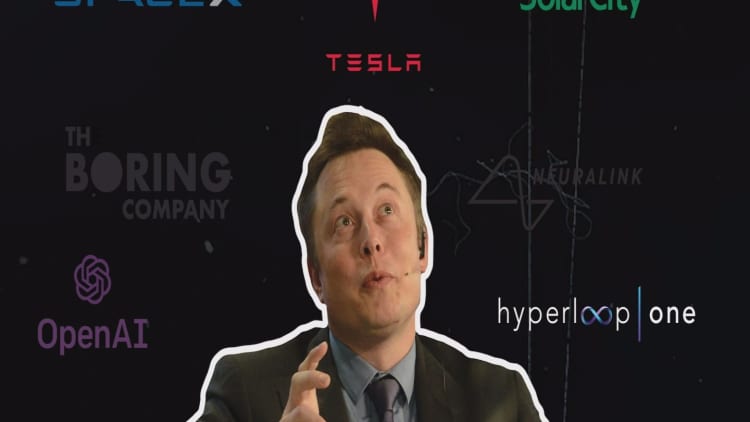For five quarters in a row ahead of Wednesday earnings, free cash flow has been negative at Tesla, and the electric-car maker has been burning through more than $6,500 every minute, according to data compiled by Bloomberg this week.
What's more, executives, including on the financial department, are coming and going.
Yet this isn't the first time Tesla has had to survive some pretty harsh financial woes. And no one knows that better than Deepak Ahuja. The CFO joined Tesla in July 2008. Two months later the global economy crashed. Challenged with managing Tesla's balance sheet through the 2008 crisis, Ahuja saw Tesla through its hugely successful IPO just two years later. Shares of the company continued on their upward trajectory, and in 2015 Ahuja retired somewhat of a hero.
Now he's back to reclaim his hero status as a cash-manager, having retaken the CFO post in February 2017 after Jason Wheeler left the company.
Ahuja's task will be difficult, and there probably will be speed bumps. Tesla continues to burn through cash at an alarming rate and could run out of money before year-end, according to the most bearish analyst reports. Last year the company raised more than $1 billion in equity and later offered almost $2 billion in a junk-debt issue. In late March, Moody's downgraded Tesla credit and changed the outlook to "negative" from "stable."
In its Wednesday earnings report for the first quarter, even though cash flow remained negative, Tesla reported a slower cash burn rate and losses that were narrower than expected. Revenue rose to $3.41 billion, outpacing analysts estimates of $3.22 billion, but it continues to spend heavily to meet production goals. Tesla ended the first quarter with a cash balance of $2.7 billion, down from $3.4 billion the previous time it reported.

Shares of the electric-car maker are down roughly 4 percent this year after boasting a near-47 percent gain in 2017. Recently, the stock has come under pressure amid investor conflict if whether Tesla's technological advances are enough to offset production setbacks. Short interest, including some high-profile hedge fund bets against Tesla, reached 30 percent of publicly available shares recently. Tesla shares hit an all-time high of $389 in September but are down about 25 percent from that high. Trading near-$300 is still a 17 times gain from its IPO price of $17 in 2010.
"There are many, many existential threats that come along on a daily, weekly or quarterly basis; they are always there," Ahuja said when speaking last year at the Indian Institutes of Technology where he studied as an undergraduate. He does not expect the high-stakes, high-risk aspect of the Tesla business model to change.
The hurdles Tesla faces today are similar as when Ahuja served his first term as CFO, as he explained last year: The technology doesn't work the way the company expected. It may still be the right product, but it's not ready. Or the time to get the product to market is longer than initially thought.
There are many, many existential threats that come along on a daily, weekly or quarterly basis; they are always there.Deepak AhujaTesla CFO
Recalling earlier Tesla production issues, he said, "To compound it we had this super-aggressive production ramp we thought would go from zero to 400 cars a week, in six months, and we could barely touch 200," he said during his talk in India last year. "Dealing with that becomes an existential crisis because the revenue is not coming and costs are piling up. Those challenges don't stop, and I don't think they are over for Tesla. There's still a big path ahead of us."
There's now more pressure on the finance team to oversee more stringent spending, with Musk citing questionable company expenditures in a recently leaked email to employees:
"A fair criticism leveled at Tesla by outside critics is that you're not a real company unless you generate a profit, meaning simply that revenue exceeds costs. ... Going forward, we will be far more rigorous about expenditures. I have asked the Tesla finance team to comb through every expense worldwide, no matter how small, and cut everything that doesn't have a strong value justification. All capital or other expenditures above a million dollars, or where a set of related expenses may accumulate to a million dollars over the next 12 months, should be considered on hold until explicitly approved by me."
Driving back to the future
When the global economy tanked in 2008, things got so bad at Tesla, so fast, Ahuja couldn't face telling his family. Tesla was closing on a $100 million series E round "which completely fell apart," Ahuja noted last year in India, "and it meant we had to completely redesign our business plan," he said.
He spared no one when it came to considering cuts. Tesla laid off 30 percent of its workers. "I thought maybe I'll be let go. It made sense. Why have a high-paid CFO when you don't need it?"
"Those were the dark, dark days — the nuclear winter, so to say," Ahuja recalled last year. "We went through a period where we felt like payroll won't be met next week."
The only money coming in was Elon Musk's personal investment in the company. After having moved his family across the country from a stable job at Ford to Tesla, the executive faced a stark reality: "I was prepared to move in a week if Tesla blew up, and it could have happened, I am sure," he said. "Somehow we survived that."
Today CFRA's Levy thinks the fears of imminent bankruptcy in Tesla's case are overstated. "I think it doesn't matter a whole lot what they announce this quarter. Most of the bulls and bears will dig in," he said. "To me the catalyst is to start meeting objectives."
Levy believes they are closer to the date where they can start turning things around on a sustainable level, generating cash flow and making a profit. "But the longer it takes for them to make the Model 3 viable, the greater the risk."
"It's just one quarter; this is a multiyear story," said David Whiston, auto equity Morningstar analyst who has a fair value of $235 on the stock. "I am more optimistic than some, but very cognizant of all the risks. With all the hype, not enough attention has been paid to balance-sheet risk. Elon is the company in a sense. To investors."
"They say a lot of things, but ultimately they have to deliver," he added. "[Musk] can talk about 5,000 or 6,000 cars. ... I don't care, just make them."
Tesla last announced in early April that it was making over 2,000 Model 3s a week, and planned to reach 5,000 per week in the second quarter. In the last week of April, it hit 2,270 Model 3s, Tesla announced in its quarterly report on Wednesday.
"Earnings is what it is," Whiston said. "Pretty much the same thing every quarter, and it isn't so much one quarter that matters. ... Even if later in the year Elon's projections turn out to be true, they are not done with the portfolio, the semi truck and Model Y, and all that takes a lot of money."
Musk takes on 'boring' Wall Street analysts
In its first quarter earnings report, Tesla said it spent over $1 billion in the quarter, but expects total capex will decrease from roughly $3.4 billion to roughly $3 billion. It is expecting positive cash flow, and net income, in both the third and fourth quarters of this year. Musk and Ahuja wrote in the quarterly letter to investors that the capex decrease would be driven by "focusing on the critical near-term needs that benefit us primarily in the next couple of years." The company said it has a plan to "significantly cut back" the amount of money it spends on its facilities and equipment.
CFRA's Levy noted that profitable quarters in the past have been achieved by Tesla, but have not been sustained, though they have preceded an additional capital raise. That's a cash-raising move that analysts believe would lessen the tail risk. After its stock reached an all-time high late last year, near $390, some analysts had expected Tesla to take advantage of the timing to issue more equity. Some still think it's the right move. "Right now, it's prudent for them to do a capital raise, an equity raise," Levy said.
Musk said again on Wednesday's call that the company had no need to raise capital. But as Tesla's cash issues linger, and analysts press for more details, Musk seems to have lost patience with the quarterly Wall Street game. During the earnings call, Musk criticized investors' focus on short-term volatility, advised investors who don't understand the long-term view to sell the stock, and slammed day traders, as well as the media. He took questions via Youtube from an individual Tesla investor, and referred to analyst questions as being "so dry," and a question on gross margins from a Bernstein analyst, specifically, as "boring" and "bonehead."
Tesla shares, which initially had moved higher in post-earnings, after-hours trading, shed as much as $2 billion in value as the call progressed.
READ MORE:
Apples's plan to repatriate $285 billion in cash to the US could be a big boost for investors
Trump's tariff proposals, trade ware wall be bad for both US and China: CNBC Survey
Companies are taking action on gun control because politicians won't: CNBC Survey






